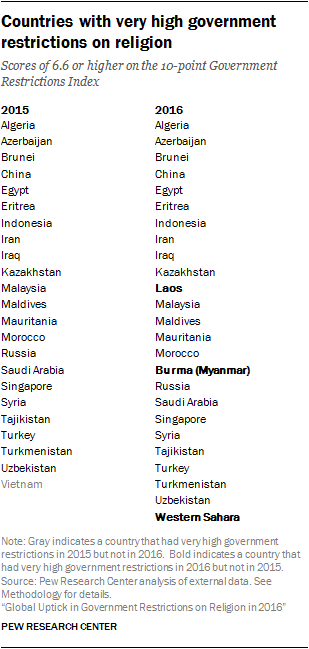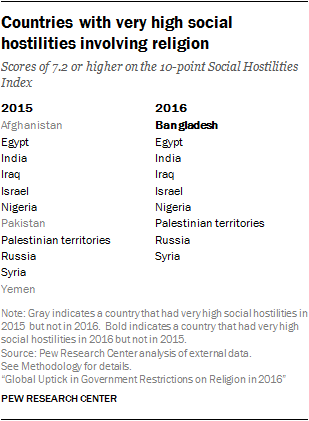In his interview with Dr. Katayoun Kishi, interviewer Benjamin P. Marcus posed a question about a likely relationship between government restrictions and social hostilities. Dr. Kishi responded that although there were instances of positive correlation between the two variables, but the data were inconclusive. In 2017, I wrote a paper with Abdalla Sirag, Ratneswary Rasiah, and Muzafar Shah Habibullah on the relationship between government restrictions and social hostilities involving religion. The study was motivated by the rising global religious oppression in Europe. Our investigation was about whether government restrictions fueled societal hostilities or vice versa. So in reply to Benjamin’s question, our finding, based on 45 European nations, showed a bi-directional positive causality between government restrictions and social hostility. However, the impact of government restrictions on social hostilities was greater in magnitude compared to the impact of social hostilities on government restrictions. In conclusion, we cautioned nations that their restrictive roles could be instrumental in inciting social hostilities.
 Dr. Kishi mentioned that countries in the categories of very high and high for government restrictions rose from 25% in 2015 to 28% in 2016. That’s a 3% increase in just one year. Indeed alarming. But a more pertinent question is: what is triggering governments to adopt a restrictive stance? The latest report by Pew Research Centre (2018) on religious restrictions flagged the prevalence of a nationalist agenda as a contributing factor, especially in Europe. An article by the BBC on Europe and nationalism highlights that nationalist and far-right parties are securing electoral gains by advocating causes such as migrant crisis and growing influence of Islam in Europe. The nationalist and far-right parties are championing the idea of national identity and curbing the rising influence of Islam. Those in European society in alignment with these views are voting into power political parties promising to implement nationalistic policies.
Dr. Kishi mentioned that countries in the categories of very high and high for government restrictions rose from 25% in 2015 to 28% in 2016. That’s a 3% increase in just one year. Indeed alarming. But a more pertinent question is: what is triggering governments to adopt a restrictive stance? The latest report by Pew Research Centre (2018) on religious restrictions flagged the prevalence of a nationalist agenda as a contributing factor, especially in Europe. An article by the BBC on Europe and nationalism highlights that nationalist and far-right parties are securing electoral gains by advocating causes such as migrant crisis and growing influence of Islam in Europe. The nationalist and far-right parties are championing the idea of national identity and curbing the rising influence of Islam. Those in European society in alignment with these views are voting into power political parties promising to implement nationalistic policies.
On reflection, an interesting observation emerges: although the migrant crisis and influence of Islam are expressed as two separate concerns, they share a common denominator: the migrants are mainly Muslims. A question that we need to ask is whether the nationalist and far-right parties would enjoy similar support if the migrants were non-Muslims. I would like to argue that what is guised as loss of national identity is, in reality, concern regarding the rising influence of Islam. The fear seems to be that the Muslim migrants do not assimilate into the local culture or, worse still, impose their beliefs and practices on their host. This then gives rise to the notion of dilution of nationality, hijacking of the local culture, and fear of it been replaced by alien practices and beliefs–a worrying prospect for many that needs assuaging, no doubt.
 Rising fear of being “replaced” among voters brings me to my earlier question: what is triggering governments to adopt a restrictive religious stance? It appears as if the political parties feel they need to put religious restrictions in place to assuage the growing fear among the masses. Even political parties not aligned to the far-right views feel coerced to take a hardliner stand to appease the worrying public. An example is Austria, where the left-wing Social Democrats and the conservative Austrian People’s Party Austria coalition implemented the ban on full-face veils in public, a measure seen necessary to counter the rise of the far-right Freedom Party. Summarizing the proposition above, we can state that the fear of rising influence of Islam has spurred the spirit of nationalism. The argument is that society concerned with the changes in the demographics of their society have voted into power, political parties that would be able to deliver a more nationalistic agenda, providing the impetus for governments in Europe to adopt a more restrictive stance.
Rising fear of being “replaced” among voters brings me to my earlier question: what is triggering governments to adopt a restrictive religious stance? It appears as if the political parties feel they need to put religious restrictions in place to assuage the growing fear among the masses. Even political parties not aligned to the far-right views feel coerced to take a hardliner stand to appease the worrying public. An example is Austria, where the left-wing Social Democrats and the conservative Austrian People’s Party Austria coalition implemented the ban on full-face veils in public, a measure seen necessary to counter the rise of the far-right Freedom Party. Summarizing the proposition above, we can state that the fear of rising influence of Islam has spurred the spirit of nationalism. The argument is that society concerned with the changes in the demographics of their society have voted into power, political parties that would be able to deliver a more nationalistic agenda, providing the impetus for governments in Europe to adopt a more restrictive stance.
How valid is this argument? I would like to present an alternative point of view: Politicization of Religion. This is where religious differences are used to create dissent, which is then instrumentalized for political gains. Remembering that it is government restrictions that fuel social hostilities rather than the other way around, we must ask whether the waves of discontent expressed by society arises organically through a reflective process or, in contrast, if these are orchestrated by political parties hoping to gain mileage by overplaying isolated incidents linked to certain religious communities. For example, as Valery Engel, the director of the European International Tolerance Center reports, “In Hungary and Poland, the government actively used the migration crisis to stir up fear toward migrants and Muslims among ordinary voters, seizing the initiative from the radicals. As a result, in 2016, the Poles and Hungarians demonstrated the highest indicators of fear of migrants and hatred of Muslims in Europe.” A satisfactory answer to the question on whether the phenomena that we observe arises from politicization of religion or an expression of nationalism or a combination of both is only possible through further research.



